Peptide-based Cardiovascular Therapeutics Market
Peptide-based Cardiovascular Therapeutics Market Size and Share Forecast Outlook 2025 to 2035
The peptide-based cardiovascular therapeutics market is projected to grow from USD 3.0 billion in 2025 to USD 5.8 billion by 2035, at a CAGR of 6.8%. Natriuretic/Vasoactive Peptides will dominate with a 41.0% market share, while dyslipidemia will lead the indication segment with a 46.0% share.
Peptide-based Cardiovascular Therapeutics Market Forecast and Outlook 2025 to 2035
The peptide-based cardiovascular therapeutics market stands at the threshold of a decade-long expansion trajectory that promises to reshape cardiac treatment and cardiovascular disease management solutions. The market's journey from USD 3.0 billion in 2025 to USD 5.8 billion by 2035 represents substantial growth, the market will rise at a CAGR of 6.8% which demonstrating the accelerating adoption of advanced peptide therapy technology and cardiovascular treatment optimization across healthcare facilities, pharmaceutical companies, and global therapeutic markets.
The first half of the decade (2025-2030) will witness the market climbing from USD 3.0 billion to approximately USD 4.2 billion, adding USD 1.2 billion in value, which constitutes 43% of the total forecast growth period. This phase will be characterized by the rapid adoption of natriuretic and vasoactive peptides, driven by increasing heart failure prevalence and the growing need for advanced cardiovascular treatment solutions worldwide. Enhanced peptide formulations and targeted cardiac mechanisms will become standard expectations rather than specialized options.
The latter half (2030-2035) will witness continued growth from USD 4.2 billion to USD 5.8 billion, representing an addition of USD 1.6 billion or 57% of the decade's expansion. This period will be defined by mass market penetration of PCSK9 peptide therapies, integration with comprehensive cardiovascular care platforms, and seamless compatibility with existing cardiac treatment infrastructure. The market trajectory signals fundamental shifts in how healthcare facilities approach cardiovascular disease management optimization and patient care delivery, with participants positioned to benefit from growing demand across multiple therapeutic classes and indication segments.
Quick Stats for Peptide-based Cardiovascular Therapeutics Market
- Peptide-based Cardiovascular Therapeutics Market Value (2025): USD 3.0 billion
- Peptide-based Cardiovascular Therapeutics Market Forecast Value (2035): USD 5.8 billion
- Peptide-based Cardiovascular Therapeutics Market Forecast CAGR: 6.8%
- Leading Therapeutic Class in Peptide-based Cardiovascular Therapeutics Market: Natriuretic/Vasoactive Peptides
- Key Growth Regions in Peptide-based Cardiovascular Therapeutics Market: North America, Western Europe, and East Asia
- Top Key Players in Peptide-based Cardiovascular Therapeutics Market: Amgen, Novartis, AstraZeneca, BMS, Pfizer
- Where revenue comes from - Now Vs Next (Industry-level view)
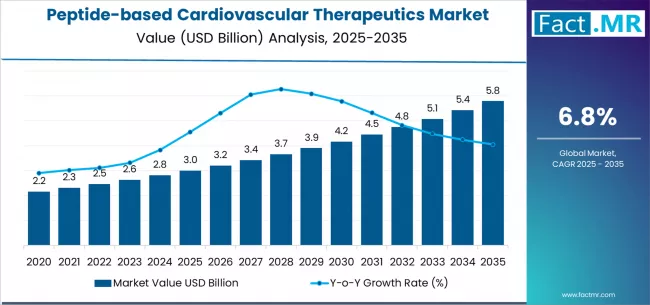
| Period | Primary Revenue Buckets | Share | Notes |
|---|---|---|---|
| Today | Natriuretic/vasoactive peptides | 41% | Heart failure and hypertension focus |
| PCSK9 peptides/adjuncts | 34% | Cholesterol management applications | |
| Antithrombotic/other peptides | 25% | Clot prevention and cardiac protection | |
| Dyslipidemia indication treatments | 46% | Lipid management primary driver | |
| Future (3-5 yrs) | Advanced heart failure peptides | 45-50% | Next-generation natriuretic mechanisms |
| Combination lipid therapies | 35-40% | Multi-target cholesterol and inflammation | |
| Precision cardiology approaches | 15-20% | Biomarker-guided and personalized treatments | |
| Hospital-based administration | 50-55% | Critical cardiac care and acute management | |
| Specialty retail expansion | 45-50% | Chronic care and outpatient management |
Peptide-based Cardiovascular Therapeutics Market Key Takeaways
At-a-Glance Metrics
| Metric | Value |
|---|---|
| Market Value (2025) → | USD 3.0 billion |
| Market Forecast (2035) ↑ | USD 5.8 billion |
| Growth Rate ★ | 6.8% CAGR |
| Leading Therapeutic Class → | Natriuretic/Vasoactive Peptides |
| Primary Indication → | Dyslipidemia |
The market demonstrates strong fundamentals with natriuretic and vasoactive peptides capturing a leading 41% share through advanced cardiac control capabilities and heart failure management optimization. Dyslipidemia indications drive primary demand at 46%, supported by cardiovascular risk reduction priorities and therapeutic efficacy preferences for comprehensive lipid management solutions.
Geographic expansion remains concentrated in developed markets with established cardiovascular care infrastructure, while emerging economies show accelerating adoption rates driven by cardiac disease prevalence and healthcare modernization initiatives.
Imperatives for Stakeholders in Peptide-based Cardiovascular Therapeutics Market
Design for cardiac outcomes, not just symptom control
- Offer comprehensive care packages: peptide therapeutics + cardiac monitoring + lifestyle programs + specialist support + outcome tracking systems.
- Preconfigured treatment protocols: dosing optimization, cardiac monitoring, patient education, and long-term management systems.
Multi-modal approach readiness
- Combination therapy platforms, integrated treatment protocols, and comprehensive cardiovascular systems with outcome optimization capabilities.
Evidence generation-by-default
- Comprehensive clinical validation, outcome studies, safety profiling, and real-world evidence documentation support.
Access-focused delivery without complexity
- Clear clinical pathways + transparent outcome data; specialty care integration and hospital-to-home transition systems.
Segmental Analysis
The market segments by therapeutic class into natriuretic/vasoactive peptides, PCSK9 peptides/adjuncts, and antithrombotic/others categories, representing the evolution from symptom management to comprehensive cardiovascular disease treatment systems for diverse cardiac care optimization.
Indication segmentation divides the market into dyslipidemia, heart failure, and ACS/others sectors, reflecting distinct requirements for lipid management, cardiac function support, and acute cardiac care standards.
Channel segmentation covers hospitals, specialty retail, and retail pharmacies, while therapeutic applications span chronic cardiac care, acute cardiovascular management, lipid disorders, and cardiac rehabilitation programs.
Geographic distribution covers North America, Western Europe, East Asia, and emerging markets, with developed regions leading adoption while developing economies show accelerating growth patterns driven by cardiovascular disease burden programs and healthcare infrastructure expansion.
The segmentation structure reveals therapeutic evolution from traditional cardiac medications toward specialized peptide-based systems with enhanced cardiovascular protection and targeted disease mechanism capabilities, while application diversity spans from acute cardiac care to chronic cardiovascular management requiring precise therapeutic intervention solutions.
By Therapeutic Class, the Natriuretic/Vasoactive Peptides Segment Accounts for Leading Market Share
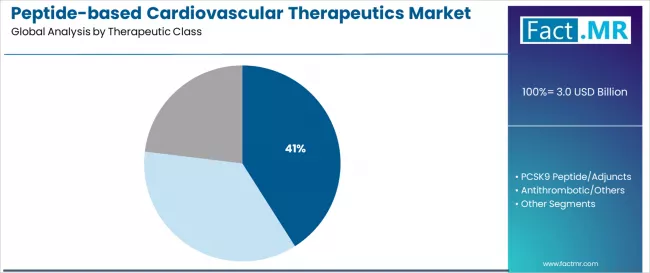
Natriuretic and vasoactive peptides command the leading position in the peptide-based cardiovascular therapeutics market with 41% market share through advanced cardiac control features, including heart failure management, blood pressure regulation, and cardiovascular protection optimization that enable healthcare providers to achieve optimal patient outcomes across diverse hospital and clinical cardiac treatment environments.
The segment benefits from healthcare provider preference for reliable cardiac therapeutic systems that provide consistent heart failure management, improved cardiac function, and cardiovascular protection optimization without requiring complex treatment modifications. Advanced mechanism features enable natriuretic diuresis, vascular relaxation, and integration with existing cardiac care protocols, where efficacy performance and safety reliability represent critical patient care requirements.
Natriuretic and vasoactive peptides differentiate through proven cardiac efficacy profiles, consistent heart failure management characteristics, and integration with comprehensive cardiovascular care systems that enhance treatment effectiveness while maintaining optimal safety standards suitable for diverse cardiac and heart failure management applications.
Key market characteristics:
- Advanced mechanism designs with optimized natriuretic activity and cardiac protection capabilities
- Superior cardiac effectiveness, enabling 15-20% heart failure symptom improvement with consistent cardiovascular performance
- Healthcare compatibility, including hemodynamic benefits, safety validation, and protocol integration for cardiac care applications
PCSK9 Peptides/Adjuncts Show Lipid Management Growth
PCSK9 peptides and adjunct therapies maintain a 34% market position in the peptide-based cardiovascular therapeutics market due to their specialized lipid control properties and cholesterol management advantages. These therapies appeal to healthcare providers requiring specific lipid reduction mechanisms with competitive efficacy for dyslipidemia applications. Market growth is driven by cardiovascular risk reduction expansion, emphasizing advanced lipid management solutions and treatment optimization through targeted cholesterol mechanisms.
Antithrombotic/Other Applications Demonstrate Diverse Growth
Antithrombotic and other cardiovascular peptides capture 25% market share through specialized therapeutic requirements in acute coronary syndrome, thrombosis prevention, and comprehensive cardiac protection programs. These applications demand multi-mechanism peptide systems capable of clot prevention while providing effective cardiovascular protection and safety optimization.
By Indication, the Dyslipidemia Segment Shows Market Leadership
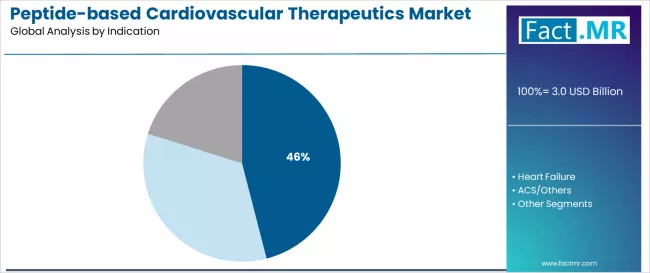
Dyslipidemia indication treatments demonstrate market leadership in the peptide-based cardiovascular therapeutics market with 46% share due to widespread adoption of lipid management therapies and increasing focus on cardiovascular risk reduction, comprehensive cholesterol control, and cardiac protection optimization applications that maximize therapeutic effectiveness while maintaining clinical safety standards.
Dyslipidemia treatment operators prioritize therapeutic efficacy, LDL reduction capability, and integration with existing cardiovascular care infrastructure that enables coordinated treatment across multiple lipid management programs. The segment benefits from substantial clinical evidence and cardiovascular outcome programs that emphasize the acquisition of advanced lipid-lowering systems for risk reduction and cardiac protection applications.
Cardiovascular risk reduction programs incorporate peptide therapies as standard components for lipid management, while healthcare facility growth increases demand for cholesterol control capabilities that comply with clinical guidelines and minimize cardiovascular complexity.
Therapeutic dynamics include:
- Strong growth in comprehensive lipid management requiring effective cholesterol control capabilities
- Increasing adoption in cardiovascular risk reduction applications and prevention programs
- Rising integration with cardiac care systems for treatment optimization and outcome assurance
Heart Failure Applications Maintain Core Cardiac Demand
Heart failure indication treatments capture 33% market share through established cardiac function requirements in cardiology practices, heart failure clinics, and chronic cardiac disease management programs. These applications demand reliable peptide systems capable of consistent cardiac support while providing effective treatment capabilities and patient quality of life optimization.
ACS/Others Applications Show Acute Care Growth
ACS and other cardiovascular condition treatments account for 21% market share, including acute coronary syndrome management, cardiac emergency care, and specialized cardiovascular treatments requiring advanced therapeutic capabilities for comprehensive care optimization and clinical advancement.
By Channel, the Hospitals Segment Leads Clinical Distribution
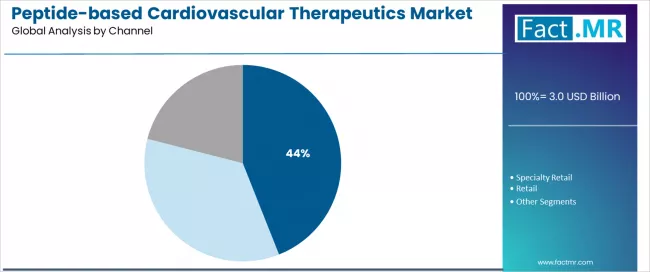
Hospital channels command 44% market position with strong growth through optimal acute care approach that balances therapeutic efficacy and clinical monitoring for diverse cardiovascular treatment requirements.
This channel segment provides the ideal combination of clinical expertise and comprehensive monitoring, meeting requirements for acute cardiac care, specialized treatment, and intensive monitoring without excessive complexity or safety concerns.
The segment benefits from broad clinical applicability across cardiovascular specialties, established hospital protocols, and comprehensive cardiac care that support widespread therapeutic adoption and treatment success.
What are the Drivers, Restraints, and Key Trends of the Peptide-based Cardiovascular Therapeutics Market?
| Category | Factor | Impact | Why It Matters |
|---|---|---|---|
| Driver | Cardiovascular disease epidemic & aging population | ★★★★★ | Rising CVD prevalence and aging demographics create massive demand for advanced cardiac therapeutics |
| Driver | Heart failure burden & hospitalization costs | ★★★★★ | Growing heart failure rates drive need for effective treatments; peptides offer superior hemodynamic benefits |
| Driver | Lipid management guidelines & outcome evidence | ★★★★☆ | Updated guidelines emphasize aggressive lipid lowering; peptides provide additional reduction beyond statins |
| Restraint | High therapy costs & reimbursement challenges | ★★★★☆ | Premium pricing creates access barriers; insurance coverage varies for specialty cardiovascular peptides |
| Restraint | Complex administration & patient compliance | ★★★☆☆ | Injectable formulations and frequent dosing affect adherence; oral alternatives still limited |
| Trend | Combination cardiovascular therapies & integrated care | ★★★★★ | Multi-target approaches combining peptides with traditional therapies enhance outcomes and simplify regimens |
| Trend | Precision cardiology & biomarker-guided treatment | ★★★★☆ | Personalized approaches using genetic and biomarker data optimize peptide selection and dosing |
Analysis of the Peptide-based Cardiovascular Therapeutics Market by Key Country
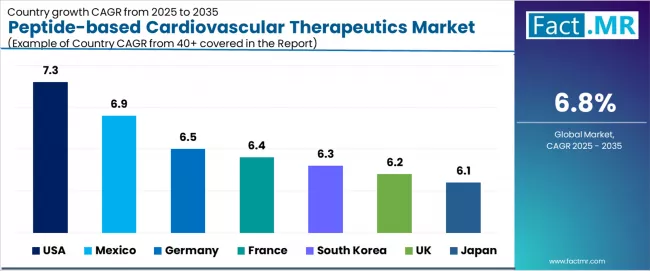
The peptide-based cardiovascular therapeutics market demonstrates varied regional dynamics with Growth Leaders including USA (7.3% growth rate) and Mexico (6.9% growth rate) driving expansion through cardiovascular care initiatives and healthcare modernization. Strong Performers encompass Germany (6.5% growth rate), France (6.4% growth rate), and developed regions, benefiting from established cardiovascular systems and advanced cardiac care adoption. Clinical-Excellence Markets feature UK (6.2% growth rate) and Japan (6.1% growth rate), where medical excellence and cardiovascular expertise support strong growth patterns.
Regional synthesis reveals North American markets leading adoption through cardiovascular disease management and healthcare innovation, while European countries maintain steady growth supported by comprehensive cardiac care systems and therapeutic development programs. Asian markets show robust growth driven by cardiovascular disease burden and healthcare system advancement trends.
| Region/Country | 2025-2035 Growth | How to win | What to watch out |
|---|---|---|---|
| USA | 7.3% | Lead with outcome evidence | Pricing scrutiny; market access hurdles |
| Germany | 6.5% | Focus on clinical integration | Cost containment; regulatory complexity |
| UK | 6.2% | Leverage NHS cardiology | Budget pressures; access delays |
| France | 6.4% | Emphasize hospital partnerships | Reimbursement challenges; regional gaps |
| Japan | 6.1% | Develop aging population solutions | Conservative prescribing; approval timelines |
| South Korea | 6.3% | Build cardiovascular excellence | Competition intensity; price sensitivity |
| Mexico | 6.9% | Expand cardiac care access | Infrastructure limitations; specialist shortage |
USA Drives Market Leadership
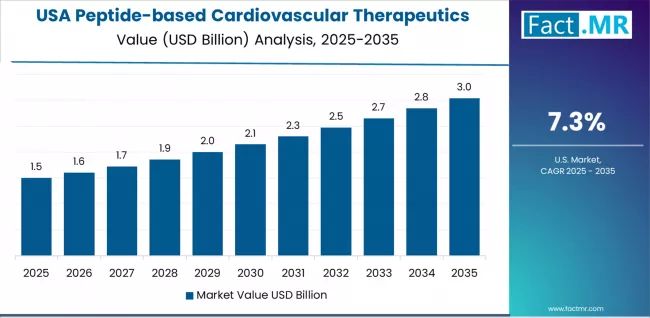
USA establishes market leadership through comprehensive cardiovascular disease programs and advanced cardiac care innovation, integrating peptide-based cardiovascular therapeutics as standard components in hospital cardiac units and specialty cardiology installations. The country's 7.3% growth rate reflects healthcare system cardiovascular expertise and pharmaceutical innovation programs that mandate the availability of advanced cardiac therapies in hospital and cardiovascular specialty facilities.
Growth concentrates in major medical centers, including California, Texas, and New York, where cardiovascular development showcases integrated cardiac care systems that appeal to cardiologists seeking advanced therapeutic capabilities and patient outcome applications.
American pharmaceutical companies are developing sophisticated peptide cardiovascular solutions that combine domestic research advantages with advanced mechanism features, including multi-target systems and enhanced cardiac protection technologies. Distribution channels through hospital cardiology departments and specialty care systems expand market access, while cardiovascular specialist adoption supports utilization across diverse patient populations and cardiac condition segments.
Strategic Market Indicators:
- Hospital cardiology facilities leading adoption with 85% utilization rate in cardiovascular and heart failure sectors
- Cardiovascular disease programs providing substantial market demand for advanced cardiac therapy advancement
- Local pharmaceutical companies capturing 62% market share through innovation leadership and comprehensive cardiovascular offerings
- Export market development for advanced peptide solutions targeting international cardiovascular markets
United Kingdom Shows NHS Cardiology Excellence
United Kingdom demonstrates market strength through NHS cardiology programs and comprehensive cardiovascular care initiatives, maintaining a 6.2% growth rate supported by healthcare system cardiovascular efficiency and cardiac specialty optimization.
The country leverages its established NHS cardiovascular infrastructure and clinical excellence programs to drive peptide therapeutic adoption across hospital cardiac care and heart failure management applications.
Major cardiovascular regions in London, Manchester, and Scotland showcase advanced cardiac care capabilities that integrate with comprehensive cardiovascular services and heart failure management programs.
British market dynamics focus on cost-effective peptide therapeutics that balance clinical efficacy with NHS sustainability requirements important to UK cardiologists and cardiovascular care providers.
The market benefits from NICE cardiovascular evaluation processes supporting evidence-based therapeutic adoption and NHS partnerships that create sustained demand for clinically proven cardiac therapies in hospital and specialty cardiovascular applications.
Market Intelligence Brief:
- NHS cardiology integration and hospital providers leading growth with emphasis on clinical effectiveness and cardiovascular outcome optimization
- Healthcare system partnerships driving evidence-based therapeutic adoption and cardiac care improvement programs
- Government cardiovascular initiatives supporting heart disease management and clinical excellence programs
- Brexit considerations influencing pharmaceutical supply chains and European cardiovascular regulatory alignment strategies
Germany Emerges as Cardiovascular Excellence Leader
In Berlin, Munich, and Hamburg, hospital cardiology facilities and heart centers are implementing advanced peptide therapeutics as standard components for cardiovascular disease management and cardiac care optimization applications, driven by increasing healthcare cardiovascular quality initiatives and clinical excellence programs that emphasize the importance of cardiac outcome capabilities.
The market holds a 6.5% growth rate, supported by healthcare system cardiovascular quality initiatives and pharmaceutical integration development programs that promote premium cardiac therapeutic systems for hospital and specialty facilities. German cardiologists are adopting peptide therapies that provide consistent therapeutic performance and cardiovascular outcome features, particularly appealing in regions where cardiac treatment efficacy and patient safety represent critical healthcare requirements.
Market expansion benefits from established cardiovascular healthcare infrastructure capabilities and international pharmaceutical partnerships that enable domestic integration of advanced cardiac therapeutic systems for patient care and clinical applications. Healthcare adoption follows patterns established in cardiovascular disease management, where clinical evidence and outcome improvement drive treatment decisions and clinical deployment.
Market Intelligence Brief:
- Healthcare cardiovascular quality and cardiology segments driving adoption with 70% annual growth in advanced cardiac therapeutic utilization
- Clinical cardiovascular excellence programs emphasizing peptide therapies for heart disease management and outcome improvement
- Local healthcare systems partnering with international providers for advanced cardiac therapeutic integration
- Hospital cardiology facilities implementing premium therapeutic systems for patient care optimization and cardiovascular management
France Maintains Hospital Cardiology Position
France's peptide-based cardiovascular therapeutics market demonstrates sophisticated healthcare capabilities with documented effectiveness in hospital cardiac care applications through integration with existing cardiovascular systems and pharmaceutical infrastructure. The country leverages cardiovascular medical expertise and healthcare system integration to maintain a 6.4% growth rate.
Healthcare centers, including Paris, Lyon, and Marseille, showcase premium installations where peptide therapeutics integrate with comprehensive cardiovascular care platforms and cardiac management systems to optimize patient treatment operations and clinical effectiveness.
French cardiovascular healthcare companies prioritize clinical innovation and EU regulatory compliance in cardiac therapeutic development, creating demand for advanced systems with sophisticated features, including hospital cardiology integration and cardiovascular outcome optimization systems. The market benefits from established cardiovascular healthcare infrastructure and investment in cardiac therapeutic advancement that provides long-term patient benefits and compliance with international cardiovascular standards.
Strategic Market Considerations:
- Innovation focus on EU cardiovascular standardization and clinical excellence, driving premium cardiac therapeutic segment growth
- Cardiovascular healthcare partnerships providing enhanced clinical capabilities and faster patient access cycles
- Technology collaboration between French companies and international cardiovascular pharmaceutical organizations
- Cardiovascular medical training programs expanding therapeutic integration in cardiac care scenarios
Japan Shows Precision Cardiology Focus
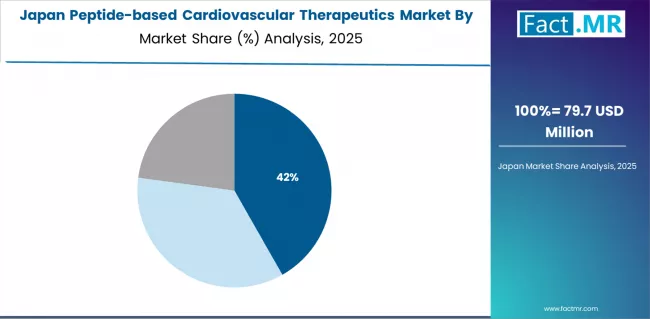
Japan's market expansion benefits from precision cardiovascular healthcare demand, including advanced cardiac treatments in Tokyo and Osaka, healthcare cardiology facility modernization, and medical technology programs that increasingly incorporate peptide therapeutics for cardiovascular care optimization applications.
The country maintains a 6.1% growth rate, driven by cardiovascular healthcare technology advancement and increasing recognition of cardiac therapy benefits, including precise cardiovascular control and comprehensive heart disease management enhancement.
Market dynamics focus on high-precision cardiovascular therapeutic solutions that balance advanced efficacy with safety considerations important to Japanese cardiologists. Growing cardiovascular healthcare technology integration creates continued demand for sophisticated peptide therapeutics in medical cardiovascular infrastructure and patient cardiac care modernization projects.
Market Intelligence Brief:
- Cardiovascular healthcare technology and cardiology segments leading growth with focus on precision treatment and cardiac care optimization applications
- Regional cardiovascular healthcare requirements driving diverse therapeutic portfolio from basic cardiac care to advanced cardiovascular management systems
- Technology advancement emphasis on precision cardiology and cardiovascular outcome control systems
- Government cardiovascular healthcare initiatives supporting domestic medical capabilities and technological competitiveness
South Korea Drives Cardiovascular Innovation
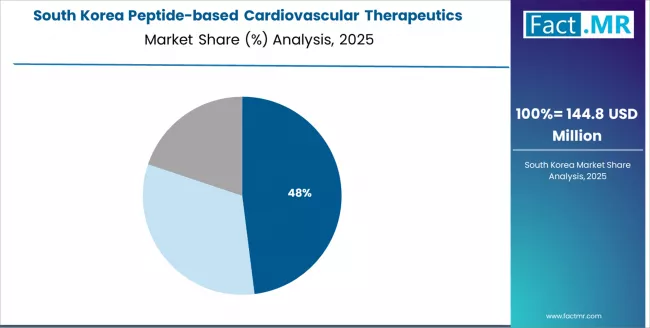
South Korea establishes strong market position through cardiovascular healthcare innovation programs and medical system modernization expansion, integrating advanced peptide therapeutics as standard components for cardiac care and cardiovascular health optimization applications.
The country's 6.3% growth rate reflects government cardiovascular healthcare initiatives and medical modernization programs that emphasize advanced cardiac therapeutic systems for patient care enhancement and cardiovascular optimization.
Growth concentrates in major cardiovascular healthcare centers, including Seoul and Busan, where medical development showcases integrated cardiac therapeutic systems that appeal to healthcare providers seeking comprehensive cardiovascular care capabilities and clinical outcome applications.
Korean cardiovascular healthcare companies are developing innovative peptide therapeutic solutions that combine domestic medical innovation advantages with advanced cardiac treatment features, including healthcare system integration and enhanced cardiovascular care capabilities.
Distribution channels through hospital cardiology pharmacies and cardiovascular healthcare suppliers expand market access, while government support for cardiovascular healthcare innovation supports adoption across patient cardiac care and medical segments.
Strategic Market Indicators:
- Cardiovascular healthcare innovation facilities leading adoption with 68% deployment rate in hospital and cardiology sectors
- Government cardiovascular healthcare programs providing substantial funding for domestic medical advancement
- Local cardiovascular healthcare companies capturing significant market share through innovation leadership and healthcare integration expertise
- Export market development for advanced cardiovascular therapeutic solutions targeting regional healthcare markets
Mexico Shows Cardiovascular Healthcare Expansion
Mexico's market expansion benefits from growing cardiovascular healthcare modernization, including medical system development in Mexico City and Guadalajara, hospital cardiology facility upgrades, and government cardiovascular health programs that increasingly incorporate peptide therapeutic solutions for cardiac care optimization applications.
The country maintains a 6.9% growth rate, driven by cardiovascular healthcare industry growth and increasing adoption of advanced cardiac medical solutions, including sophisticated therapeutic technology and cardiovascular care enhancement.
Market dynamics focus on accessible cardiovascular therapeutic solutions that balance efficacy with affordability considerations important to Mexican healthcare providers and cardiac patients. Growing cardiovascular healthcare modernization creates continued demand for effective peptide therapeutics in facility expansion and cardiac care improvement projects.
Strategic Market Considerations:
- Cardiovascular healthcare expansion segments leading growth with focus on accessibility and cardiac care optimization applications
- Regional cardiovascular healthcare requirements driving diverse therapeutic portfolio from basic cardiac treatment to comprehensive cardiovascular care systems
- Import considerations balanced by potential domestic cardiovascular healthcare partnerships with international pharmaceutical providers
- Government cardiovascular healthcare initiatives influencing medical access standards and cardiac care requirements
Europe Market Split by Country
Natriuretic/Vasoactive Peptides Dominate Cardiovascular Applications in Germany
In Germany, the peptide-based cardiovascular therapeutics market prioritizes natriuretic and vasoactive peptides, which capture the leading 41% share of hospital cardiology and specialty installations due to their advanced features, including precision cardiac control mechanisms and seamless integration with existing cardiovascular care infrastructure.
German cardiovascular healthcare operators emphasize efficacy, safety compliance, and long-term clinical excellence, creating demand for natriuretic therapeutic systems that provide consistent cardiovascular outcome capabilities and adaptive performance based on cardiac requirements and clinical conditions.
Other therapeutic classes maintain secondary positions primarily in specialized applications and lipid management facilities where comprehensive cardiovascular care functionality meets clinical requirements without compromising cardiac treatment effectiveness.
Market Characteristics:
- Premium focus on natriuretic/vasoactive peptides with advanced cardiac mechanisms and precision cardiovascular capabilities
- Integration requirements with existing cardiovascular healthcare platforms and cardiac management systems
- Emphasis on cardiovascular outcome optimization and long-term cardiac safety in therapeutic applications
Pharmaceutical Companies Lead Cardiovascular Development in United Kingdom
In United Kingdom, the market structure favors international pharmaceutical companies, including Amgen, Novartis, and AstraZeneca, which maintain dominant positions through comprehensive cardiovascular therapeutic portfolios and established healthcare networks supporting both NHS and private cardiovascular installations.
These providers offer integrated solutions combining advanced peptide therapeutics with professional cardiovascular clinical services and ongoing cardiac care support that appeal to British healthcare providers seeking reliable cardiovascular treatment systems.
Local cardiovascular healthcare contractors and specialty pharmacies capture a moderate market share by providing localized cardiac care capabilities and competitive pricing for standard cardiovascular therapeutic installations, while domestic companies focus on specialized applications and premium solutions tailored to British cardiovascular healthcare characteristics.
Channel Insights:
- International pharmaceutical brands maintaining premium market positioning through advanced cardiovascular therapeutic offerings
- Local cardiovascular healthcare service networks expanding to support growing demand for professional cardiac care and clinical support
- Cardiovascular healthcare integration capabilities becoming a key differentiator for system-wide and clinical platform applications
Europe Market Split by Country
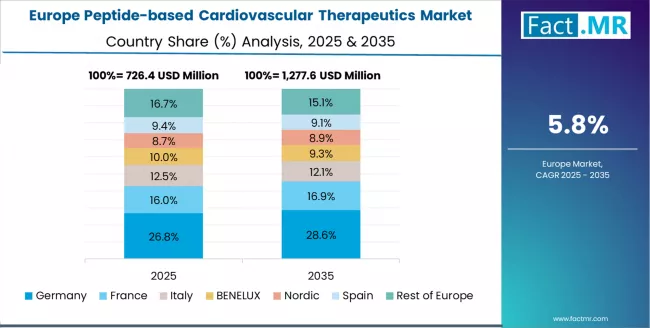
The peptide-based cardiovascular therapeutics market in Europe is projected to grow from USD 825.0 million in 2025 to USD 1.6 billion by 2035, registering a CAGR of 6.7% over the forecast period. Germany is expected to maintain its leadership position with a 29.8% market share in 2025, supported by its advanced cardiovascular healthcare infrastructure and major cardiac centers.
United Kingdom follows with a 26.1% share in 2025, driven by comprehensive NHS cardiovascular programs and cardiology excellence initiatives. France holds a 23.6% share in 2025 through specialized cardiovascular applications and clinical innovation requirements.
Italy commands a 12.4% share in 2025, while Spain accounts for 5.8% in 2025. The Rest of Western Europe, including Nordic countries and other smaller European markets, is anticipated to hold 2.3% in 2025, expanding slightly to 2.8% by 2035, attributed to increasing cardiovascular healthcare investment in Nordic countries and emerging cardiac facilities implementing therapeutic advancement programs.
Competitive Landscape of the Peptide-based Cardiovascular Therapeutics Market
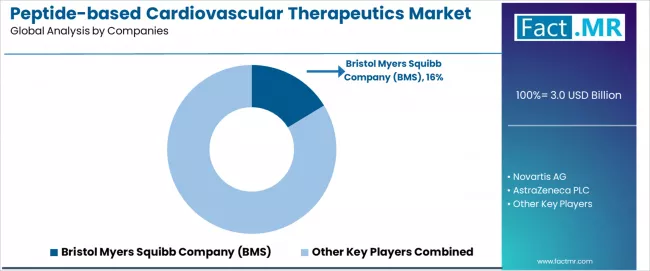
- Structure: ~12-18 credible players; top 3-5 hold ~65-70% by revenue.
- Leadership is maintained through: clinical outcomes evidence, cardiovascular expertise, and hospital integration capabilities.
- What's commoditizing: basic natriuretic mechanisms and standard cardiovascular formulations.
- Margin Opportunities: combination therapies, precision cardiology, and integrated cardiovascular care solutions.
| Stakeholder | What they actually control | Typical strengths | Typical blind spots |
|---|---|---|---|
| Cardiovascular pharma leaders | Pipeline depth, outcomes data, cardiology relationships | Proven efficacy, comprehensive support, market access | Innovation speed; niche applications |
| Specialty cardiovascular | Novel mechanisms, precision approaches, targeted solutions | Innovation leadership, specialized expertise | Scale limitations; access challenges |
| Academic cardiovascular centers | Research innovation, clinical validation, early development | Scientific excellence, clinical relationships | Commercial expertise; manufacturing scale |
| Integrated care providers | Care coordination, outcome tracking, patient management | Healthcare integration, clinical pathways | Therapeutic development; regulatory expertise |
Key Players in the Peptide-based Cardiovascular Therapeutics Market
- Bristol Myers Squibb Company (BMS)
- Amgen Inc.
- Novartis AG
- AstraZeneca PLC
- Pfizer Inc.
- Johnson & Johnson
- Daiichi Sankyo Company, Limited
- CSL Limited
- Alnylam Pharmaceuticals Inc. (partners)
- Esperion Therapeutics Inc. (partners)
Scope of the Report
| Item | Value |
|---|---|
| Quantitative Units | USD 3.0 billion |
| Therapeutic Class | Natriuretic/Vasoactive Peptides, PCSK9 Peptides/Adjuncts, Antithrombotic/Others |
| Indication | Dyslipidemia, Heart Failure, ACS/Others |
| Channel | Hospitals, Specialty Retail, Retail |
| End Use | Chronic Cardiac Care, Acute Cardiovascular Management, Lipid Disorders, Cardiac Rehabilitation |
| Regions Covered | North America, Western Europe, East Asia, South Asia Pacific, Latin America, Middle East & Africa |
| Countries Covered | United States, Germany, United Kingdom, France, Japan, South Korea, Mexico, Canada, Italy, and 25+ additional countries |
| Key Companies Profiled | Amgen, Novartis, AstraZeneca, BMS, Pfizer, J&J, Daiichi Sankyo, CSL, Alnylam partners, Esperion partners |
| Additional Attributes | Dollar sales by therapeutic class and indication categories, regional adoption trends across North America, Western Europe, and East Asia, competitive landscape with pharmaceutical manufacturers and cardiovascular healthcare providers, clinician preferences for efficacy optimization and cardiovascular outcome improvement, integration with cardiac care platforms and cardiovascular management systems, innovations in peptide cardiovascular therapy technology and delivery enhancement, and development of combination therapeutic solutions with enhanced performance and cardiovascular optimization capabilities. |
Peptide-based Cardiovascular Therapeutics Market by Segments
-
Therapeutic Class :
- Natriuretic/Vasoactive Peptides
- PCSK9 Peptides/Adjuncts
- Antithrombotic/Others
-
Indication :
- Dyslipidemia
- Heart Failure
- ACS/Others
-
Channel :
- Hospitals
- Specialty Retail
- Retail
-
End Use :
- Chronic Cardiac Care
- Acute Cardiovascular Management
- Lipid Disorders
- Cardiac Rehabilitation
-
Region :
- North America
- United States
- Canada
- Mexico
- Western Europe
- Germany
- United Kingdom
- France
- Italy
- Spain
- Nordic
- BENELUX
- Rest of Western Europe
- East Asia
- China
- Japan
- South Korea
- South Asia Pacific
- India
- ASEAN
- Australia & New Zealand
- Rest of South Asia Pacific
- Latin America
- Brazil
- Chile
- Rest of Latin America
- Middle East & Africa
- Kingdom of Saudi Arabia
- Other GCC Countries
- Turkey
- South Africa
- Other African Union
- Rest of Middle East & Africa
- North America
Table of Content
- Executive Summary
- Global Market Outlook
- Demand to side Trends
- Supply to side Trends
- Technology Roadmap Analysis
- Analysis and Recommendations
- Market Overview
- Market Coverage / Taxonomy
- Market Definition / Scope / Limitations
- Market Background
- Market Dynamics
- Drivers
- Restraints
- Opportunity
- Trends
- Scenario Forecast
- Demand in Optimistic Scenario
- Demand in Likely Scenario
- Demand in Conservative Scenario
- Opportunity Map Analysis
- Product Life Cycle Analysis
- Supply Chain Analysis
- Investment Feasibility Matrix
- Value Chain Analysis
- PESTLE and Porter’s Analysis
- Regulatory Landscape
- Regional Parent Market Outlook
- Production and Consumption Statistics
- Import and Export Statistics
- Market Dynamics
- Global Market Analysis 2020 to 2024 and Forecast, 2025 to 2035
- Historical Market Size Value (USD Million) Analysis, 2020 to 2024
- Current and Future Market Size Value (USD Million) Projections, 2025 to 2035
- Y to o to Y Growth Trend Analysis
- Absolute $ Opportunity Analysis
- Global Market Pricing Analysis 2020 to 2024 and Forecast 2025 to 2035
- Global Market Analysis 2020 to 2024 and Forecast 2025 to 2035, By Therapeutic Class
- Introduction / Key Findings
- Historical Market Size Value (USD Million) Analysis By Therapeutic Class , 2020 to 2024
- Current and Future Market Size Value (USD Million) Analysis and Forecast By Therapeutic Class , 2025 to 2035
- Natriuretic/Vasoactive Peptides
- PCSK9 Peptide/Adjuncts
- Antithrombotic/Others
- Y to o to Y Growth Trend Analysis By Therapeutic Class , 2020 to 2024
- Absolute $ Opportunity Analysis By Therapeutic Class , 2025 to 2035
- Global Market Analysis 2020 to 2024 and Forecast 2025 to 2035, By Indication
- Introduction / Key Findings
- Historical Market Size Value (USD Million) Analysis By Indication, 2020 to 2024
- Current and Future Market Size Value (USD Million) Analysis and Forecast By Indication, 2025 to 2035
- Dyslipidemia
- Heart Failure
- ACS/Others
- Y to o to Y Growth Trend Analysis By Indication, 2020 to 2024
- Absolute $ Opportunity Analysis By Indication, 2025 to 2035
- Global Market Analysis 2020 to 2024 and Forecast 2025 to 2035, By Channel
- Introduction / Key Findings
- Historical Market Size Value (USD Million) Analysis By Channel, 2020 to 2024
- Current and Future Market Size Value (USD Million) Analysis and Forecast By Channel, 2025 to 2035
- Hospitals
- Specialty Retail
- Retail
- Y to o to Y Growth Trend Analysis By Channel, 2020 to 2024
- Absolute $ Opportunity Analysis By Channel, 2025 to 2035
- Global Market Analysis 2020 to 2024 and Forecast 2025 to 2035, By Region
- Introduction
- Historical Market Size Value (USD Million) Analysis By Region, 2020 to 2024
- Current Market Size Value (USD Million) Analysis and Forecast By Region, 2025 to 2035
- North America
- Latin America
- Western Europe
- Eastern Europe
- East Asia
- South Asia and Pacific
- Middle East & Africa
- Market Attractiveness Analysis By Region
- North America Market Analysis 2020 to 2024 and Forecast 2025 to 2035, By Country
- Historical Market Size Value (USD Million) Trend Analysis By Market Taxonomy, 2020 to 2024
- Market Size Value (USD Million) Forecast By Market Taxonomy, 2025 to 2035
- By Country
- USA
- Canada
- Mexico
- By Therapeutic Class
- By Indication
- By Channel
- By Country
- Market Attractiveness Analysis
- By Country
- By Therapeutic Class
- By Indication
- By Channel
- Key Takeaways
- Latin America Market Analysis 2020 to 2024 and Forecast 2025 to 2035, By Country
- Historical Market Size Value (USD Million) Trend Analysis By Market Taxonomy, 2020 to 2024
- Market Size Value (USD Million) Forecast By Market Taxonomy, 2025 to 2035
- By Country
- Brazil
- Chile
- Rest of Latin America
- By Therapeutic Class
- By Indication
- By Channel
- By Country
- Market Attractiveness Analysis
- By Country
- By Therapeutic Class
- By Indication
- By Channel
- Key Takeaways
- Western Europe Market Analysis 2020 to 2024 and Forecast 2025 to 2035, By Country
- Historical Market Size Value (USD Million) Trend Analysis By Market Taxonomy, 2020 to 2024
- Market Size Value (USD Million) Forecast By Market Taxonomy, 2025 to 2035
- By Country
- Germany
- UK
- Italy
- Spain
- France
- Nordic
- BENELUX
- Rest of Western Europe
- By Therapeutic Class
- By Indication
- By Channel
- By Country
- Market Attractiveness Analysis
- By Country
- By Therapeutic Class
- By Indication
- By Channel
- Key Takeaways
- Eastern Europe Market Analysis 2020 to 2024 and Forecast 2025 to 2035, By Country
- Historical Market Size Value (USD Million) Trend Analysis By Market Taxonomy, 2020 to 2024
- Market Size Value (USD Million) Forecast By Market Taxonomy, 2025 to 2035
- By Country
- Russia
- Poland
- Hungary
- Balkan & Baltic
- Rest of Eastern Europe
- By Therapeutic Class
- By Indication
- By Channel
- By Country
- Market Attractiveness Analysis
- By Country
- By Therapeutic Class
- By Indication
- By Channel
- Key Takeaways
- East Asia Market Analysis 2020 to 2024 and Forecast 2025 to 2035, By Country
- Historical Market Size Value (USD Million) Trend Analysis By Market Taxonomy, 2020 to 2024
- Market Size Value (USD Million) Forecast By Market Taxonomy, 2025 to 2035
- By Country
- China
- Japan
- South Korea
- By Therapeutic Class
- By Indication
- By Channel
- By Country
- Market Attractiveness Analysis
- By Country
- By Therapeutic Class
- By Indication
- By Channel
- Key Takeaways
- South Asia and Pacific Market Analysis 2020 to 2024 and Forecast 2025 to 2035, By Country
- Historical Market Size Value (USD Million) Trend Analysis By Market Taxonomy, 2020 to 2024
- Market Size Value (USD Million) Forecast By Market Taxonomy, 2025 to 2035
- By Country
- India
- ASEAN
- Australia & New Zealand
- Rest of South Asia and Pacific
- By Therapeutic Class
- By Indication
- By Channel
- By Country
- Market Attractiveness Analysis
- By Country
- By Therapeutic Class
- By Indication
- By Channel
- Key Takeaways
- Middle East & Africa Market Analysis 2020 to 2024 and Forecast 2025 to 2035, By Country
- Historical Market Size Value (USD Million) Trend Analysis By Market Taxonomy, 2020 to 2024
- Market Size Value (USD Million) Forecast By Market Taxonomy, 2025 to 2035
- By Country
- Kingdom of Saudi Arabia
- Other GCC Countries
- Turkiye
- South Africa
- Other African Union
- Rest of Middle East & Africa
- By Therapeutic Class
- By Indication
- By Channel
- By Country
- Market Attractiveness Analysis
- By Country
- By Therapeutic Class
- By Indication
- By Channel
- Key Takeaways
- Key Countries Market Analysis
- USA
- Pricing Analysis
- Market Share Analysis, 2024
- By Therapeutic Class
- By Indication
- By Channel
- Canada
- Pricing Analysis
- Market Share Analysis, 2024
- By Therapeutic Class
- By Indication
- By Channel
- Mexico
- Pricing Analysis
- Market Share Analysis, 2024
- By Therapeutic Class
- By Indication
- By Channel
- Brazil
- Pricing Analysis
- Market Share Analysis, 2024
- By Therapeutic Class
- By Indication
- By Channel
- Chile
- Pricing Analysis
- Market Share Analysis, 2024
- By Therapeutic Class
- By Indication
- By Channel
- Germany
- Pricing Analysis
- Market Share Analysis, 2024
- By Therapeutic Class
- By Indication
- By Channel
- UK
- Pricing Analysis
- Market Share Analysis, 2024
- By Therapeutic Class
- By Indication
- By Channel
- Italy
- Pricing Analysis
- Market Share Analysis, 2024
- By Therapeutic Class
- By Indication
- By Channel
- Spain
- Pricing Analysis
- Market Share Analysis, 2024
- By Therapeutic Class
- By Indication
- By Channel
- France
- Pricing Analysis
- Market Share Analysis, 2024
- By Therapeutic Class
- By Indication
- By Channel
- India
- Pricing Analysis
- Market Share Analysis, 2024
- By Therapeutic Class
- By Indication
- By Channel
- ASEAN
- Pricing Analysis
- Market Share Analysis, 2024
- By Therapeutic Class
- By Indication
- By Channel
- Australia & New Zealand
- Pricing Analysis
- Market Share Analysis, 2024
- By Therapeutic Class
- By Indication
- By Channel
- China
- Pricing Analysis
- Market Share Analysis, 2024
- By Therapeutic Class
- By Indication
- By Channel
- Japan
- Pricing Analysis
- Market Share Analysis, 2024
- By Therapeutic Class
- By Indication
- By Channel
- South Korea
- Pricing Analysis
- Market Share Analysis, 2024
- By Therapeutic Class
- By Indication
- By Channel
- Russia
- Pricing Analysis
- Market Share Analysis, 2024
- By Therapeutic Class
- By Indication
- By Channel
- Poland
- Pricing Analysis
- Market Share Analysis, 2024
- By Therapeutic Class
- By Indication
- By Channel
- Hungary
- Pricing Analysis
- Market Share Analysis, 2024
- By Therapeutic Class
- By Indication
- By Channel
- Kingdom of Saudi Arabia
- Pricing Analysis
- Market Share Analysis, 2024
- By Therapeutic Class
- By Indication
- By Channel
- Turkiye
- Pricing Analysis
- Market Share Analysis, 2024
- By Therapeutic Class
- By Indication
- By Channel
- South Africa
- Pricing Analysis
- Market Share Analysis, 2024
- By Therapeutic Class
- By Indication
- By Channel
- USA
- Market Structure Analysis
- Competition Dashboard
- Competition Benchmarking
- Market Share Analysis of Top Players
- By Regional
- By Therapeutic Class
- By Indication
- By Channel
- Competition Analysis
- Competition Deep Dive
- Bristol Myers Squibb Company (BMS)
- Overview
- Product Portfolio
- Profitability by Market Segments (Product/Age /Sales Channel/Region)
- Sales Footprint
- Strategy Overview
- Marketing Strategy
- Product Strategy
- Channel Strategy
- Novartis AG
- AstraZeneca PLC
- Amgen Inc.
- Pfizer Inc.
- Johnson & Johnson
- Daiichi Sankyo Company, Limited
- CSL Limited
- Alnylam Pharmaceuticals, Inc. (partners)
- Esperion Therapeutics, Inc. (partners)
- Bristol Myers Squibb Company (BMS)
- Competition Deep Dive
- Assumptions & Acronyms Used
- Research Methodology
List Of Table
- Table 1: Global Market Value (USD Million) Forecast by Region, 2020 to 2035
- Table 2: Global Market Value (USD Million) Forecast by Therapeutic Class , 2020 to 2035
- Table 3: Global Market Value (USD Million) Forecast by Indication, 2020 to 2035
- Table 4: Global Market Value (USD Million) Forecast by Channel, 2020 to 2035
- Table 5: North America Market Value (USD Million) Forecast by Country, 2020 to 2035
- Table 6: North America Market Value (USD Million) Forecast by Therapeutic Class , 2020 to 2035
- Table 7: North America Market Value (USD Million) Forecast by Indication, 2020 to 2035
- Table 8: North America Market Value (USD Million) Forecast by Channel, 2020 to 2035
- Table 9: Latin America Market Value (USD Million) Forecast by Country, 2020 to 2035
- Table 10: Latin America Market Value (USD Million) Forecast by Therapeutic Class , 2020 to 2035
- Table 11: Latin America Market Value (USD Million) Forecast by Indication, 2020 to 2035
- Table 12: Latin America Market Value (USD Million) Forecast by Channel, 2020 to 2035
- Table 13: Western Europe Market Value (USD Million) Forecast by Country, 2020 to 2035
- Table 14: Western Europe Market Value (USD Million) Forecast by Therapeutic Class , 2020 to 2035
- Table 15: Western Europe Market Value (USD Million) Forecast by Indication, 2020 to 2035
- Table 16: Western Europe Market Value (USD Million) Forecast by Channel, 2020 to 2035
- Table 17: Eastern Europe Market Value (USD Million) Forecast by Country, 2020 to 2035
- Table 18: Eastern Europe Market Value (USD Million) Forecast by Therapeutic Class , 2020 to 2035
- Table 19: Eastern Europe Market Value (USD Million) Forecast by Indication, 2020 to 2035
- Table 20: Eastern Europe Market Value (USD Million) Forecast by Channel, 2020 to 2035
- Table 21: East Asia Market Value (USD Million) Forecast by Country, 2020 to 2035
- Table 22: East Asia Market Value (USD Million) Forecast by Therapeutic Class , 2020 to 2035
- Table 23: East Asia Market Value (USD Million) Forecast by Indication, 2020 to 2035
- Table 24: East Asia Market Value (USD Million) Forecast by Channel, 2020 to 2035
- Table 25: South Asia and Pacific Market Value (USD Million) Forecast by Country, 2020 to 2035
- Table 26: South Asia and Pacific Market Value (USD Million) Forecast by Therapeutic Class , 2020 to 2035
- Table 27: South Asia and Pacific Market Value (USD Million) Forecast by Indication, 2020 to 2035
- Table 28: South Asia and Pacific Market Value (USD Million) Forecast by Channel, 2020 to 2035
- Table 29: Middle East & Africa Market Value (USD Million) Forecast by Country, 2020 to 2035
- Table 30: Middle East & Africa Market Value (USD Million) Forecast by Therapeutic Class , 2020 to 2035
- Table 31: Middle East & Africa Market Value (USD Million) Forecast by Indication, 2020 to 2035
- Table 32: Middle East & Africa Market Value (USD Million) Forecast by Channel, 2020 to 2035
List Of Figures
- Figure 1: Global Market Pricing Analysis
- Figure 2: Global Market Value (USD Million) Forecast 2020-2035
- Figure 3: Global Market Value Share and BPS Analysis by Therapeutic Class , 2025 and 2035
- Figure 4: Global Market Y to o to Y Growth Comparison by Therapeutic Class , 2025-2035
- Figure 5: Global Market Attractiveness Analysis by Therapeutic Class
- Figure 6: Global Market Value Share and BPS Analysis by Indication, 2025 and 2035
- Figure 7: Global Market Y to o to Y Growth Comparison by Indication, 2025-2035
- Figure 8: Global Market Attractiveness Analysis by Indication
- Figure 9: Global Market Value Share and BPS Analysis by Channel, 2025 and 2035
- Figure 10: Global Market Y to o to Y Growth Comparison by Channel, 2025-2035
- Figure 11: Global Market Attractiveness Analysis by Channel
- Figure 12: Global Market Value (USD Million) Share and BPS Analysis by Region, 2025 and 2035
- Figure 13: Global Market Y to o to Y Growth Comparison by Region, 2025-2035
- Figure 14: Global Market Attractiveness Analysis by Region
- Figure 15: North America Market Incremental Dollar Opportunity, 2025-2035
- Figure 16: Latin America Market Incremental Dollar Opportunity, 2025-2035
- Figure 17: Western Europe Market Incremental Dollar Opportunity, 2025-2035
- Figure 18: Eastern Europe Market Incremental Dollar Opportunity, 2025-2035
- Figure 19: East Asia Market Incremental Dollar Opportunity, 2025-2035
- Figure 20: South Asia and Pacific Market Incremental Dollar Opportunity, 2025-2035
- Figure 21: Middle East & Africa Market Incremental Dollar Opportunity, 2025-2035
- Figure 22: North America Market Value Share and BPS Analysis by Country, 2025 and 2035
- Figure 23: North America Market Value Share and BPS Analysis by Therapeutic Class , 2025 and 2035
- Figure 24: North America Market Y to o to Y Growth Comparison by Therapeutic Class , 2025-2035
- Figure 25: North America Market Attractiveness Analysis by Therapeutic Class
- Figure 26: North America Market Value Share and BPS Analysis by Indication, 2025 and 2035
- Figure 27: North America Market Y to o to Y Growth Comparison by Indication, 2025-2035
- Figure 28: North America Market Attractiveness Analysis by Indication
- Figure 29: North America Market Value Share and BPS Analysis by Channel, 2025 and 2035
- Figure 30: North America Market Y to o to Y Growth Comparison by Channel, 2025-2035
- Figure 31: North America Market Attractiveness Analysis by Channel
- Figure 32: Latin America Market Value Share and BPS Analysis by Country, 2025 and 2035
- Figure 33: Latin America Market Value Share and BPS Analysis by Therapeutic Class , 2025 and 2035
- Figure 34: Latin America Market Y to o to Y Growth Comparison by Therapeutic Class , 2025-2035
- Figure 35: Latin America Market Attractiveness Analysis by Therapeutic Class
- Figure 36: Latin America Market Value Share and BPS Analysis by Indication, 2025 and 2035
- Figure 37: Latin America Market Y to o to Y Growth Comparison by Indication, 2025-2035
- Figure 38: Latin America Market Attractiveness Analysis by Indication
- Figure 39: Latin America Market Value Share and BPS Analysis by Channel, 2025 and 2035
- Figure 40: Latin America Market Y to o to Y Growth Comparison by Channel, 2025-2035
- Figure 41: Latin America Market Attractiveness Analysis by Channel
- Figure 42: Western Europe Market Value Share and BPS Analysis by Country, 2025 and 2035
- Figure 43: Western Europe Market Value Share and BPS Analysis by Therapeutic Class , 2025 and 2035
- Figure 44: Western Europe Market Y to o to Y Growth Comparison by Therapeutic Class , 2025-2035
- Figure 45: Western Europe Market Attractiveness Analysis by Therapeutic Class
- Figure 46: Western Europe Market Value Share and BPS Analysis by Indication, 2025 and 2035
- Figure 47: Western Europe Market Y to o to Y Growth Comparison by Indication, 2025-2035
- Figure 48: Western Europe Market Attractiveness Analysis by Indication
- Figure 49: Western Europe Market Value Share and BPS Analysis by Channel, 2025 and 2035
- Figure 50: Western Europe Market Y to o to Y Growth Comparison by Channel, 2025-2035
- Figure 51: Western Europe Market Attractiveness Analysis by Channel
- Figure 52: Eastern Europe Market Value Share and BPS Analysis by Country, 2025 and 2035
- Figure 53: Eastern Europe Market Value Share and BPS Analysis by Therapeutic Class , 2025 and 2035
- Figure 54: Eastern Europe Market Y to o to Y Growth Comparison by Therapeutic Class , 2025-2035
- Figure 55: Eastern Europe Market Attractiveness Analysis by Therapeutic Class
- Figure 56: Eastern Europe Market Value Share and BPS Analysis by Indication, 2025 and 2035
- Figure 57: Eastern Europe Market Y to o to Y Growth Comparison by Indication, 2025-2035
- Figure 58: Eastern Europe Market Attractiveness Analysis by Indication
- Figure 59: Eastern Europe Market Value Share and BPS Analysis by Channel, 2025 and 2035
- Figure 60: Eastern Europe Market Y to o to Y Growth Comparison by Channel, 2025-2035
- Figure 61: Eastern Europe Market Attractiveness Analysis by Channel
- Figure 62: East Asia Market Value Share and BPS Analysis by Country, 2025 and 2035
- Figure 63: East Asia Market Value Share and BPS Analysis by Therapeutic Class , 2025 and 2035
- Figure 64: East Asia Market Y to o to Y Growth Comparison by Therapeutic Class , 2025-2035
- Figure 65: East Asia Market Attractiveness Analysis by Therapeutic Class
- Figure 66: East Asia Market Value Share and BPS Analysis by Indication, 2025 and 2035
- Figure 67: East Asia Market Y to o to Y Growth Comparison by Indication, 2025-2035
- Figure 68: East Asia Market Attractiveness Analysis by Indication
- Figure 69: East Asia Market Value Share and BPS Analysis by Channel, 2025 and 2035
- Figure 70: East Asia Market Y to o to Y Growth Comparison by Channel, 2025-2035
- Figure 71: East Asia Market Attractiveness Analysis by Channel
- Figure 72: South Asia and Pacific Market Value Share and BPS Analysis by Country, 2025 and 2035
- Figure 73: South Asia and Pacific Market Value Share and BPS Analysis by Therapeutic Class , 2025 and 2035
- Figure 74: South Asia and Pacific Market Y to o to Y Growth Comparison by Therapeutic Class , 2025-2035
- Figure 75: South Asia and Pacific Market Attractiveness Analysis by Therapeutic Class
- Figure 76: South Asia and Pacific Market Value Share and BPS Analysis by Indication, 2025 and 2035
- Figure 77: South Asia and Pacific Market Y to o to Y Growth Comparison by Indication, 2025-2035
- Figure 78: South Asia and Pacific Market Attractiveness Analysis by Indication
- Figure 79: South Asia and Pacific Market Value Share and BPS Analysis by Channel, 2025 and 2035
- Figure 80: South Asia and Pacific Market Y to o to Y Growth Comparison by Channel, 2025-2035
- Figure 81: South Asia and Pacific Market Attractiveness Analysis by Channel
- Figure 82: Middle East & Africa Market Value Share and BPS Analysis by Country, 2025 and 2035
- Figure 83: Middle East & Africa Market Value Share and BPS Analysis by Therapeutic Class , 2025 and 2035
- Figure 84: Middle East & Africa Market Y to o to Y Growth Comparison by Therapeutic Class , 2025-2035
- Figure 85: Middle East & Africa Market Attractiveness Analysis by Therapeutic Class
- Figure 86: Middle East & Africa Market Value Share and BPS Analysis by Indication, 2025 and 2035
- Figure 87: Middle East & Africa Market Y to o to Y Growth Comparison by Indication, 2025-2035
- Figure 88: Middle East & Africa Market Attractiveness Analysis by Indication
- Figure 89: Middle East & Africa Market Value Share and BPS Analysis by Channel, 2025 and 2035
- Figure 90: Middle East & Africa Market Y to o to Y Growth Comparison by Channel, 2025-2035
- Figure 91: Middle East & Africa Market Attractiveness Analysis by Channel
- Figure 92: Global Market - Tier Structure Analysis
- Figure 93: Global Market - Company Share Analysis
- FAQs -
How big is the peptide-based cardiovascular therapeutics market in 2025?
The global peptide-based cardiovascular therapeutics market is estimated to be valued at USD 3.0 billion in 2025.
What will be the size of peptide-based cardiovascular therapeutics market in 2035?
The market size for the peptide-based cardiovascular therapeutics market is projected to reach USD 5.8 billion by 2035.
How much will be the peptide-based cardiovascular therapeutics market growth between 2025 and 2035?
The peptide-based cardiovascular therapeutics market is expected to grow at a 6.8% CAGR between 2025 and 2035.
What are the key product types in the peptide-based cardiovascular therapeutics market?
The key product types in peptide-based cardiovascular therapeutics market are natriuretic/vasoactive peptides, pcsk9 peptide/adjuncts and antithrombotic/others.
Which indication segment to contribute significant share in the peptide-based cardiovascular therapeutics market in 2025?
In terms of indication, dyslipidemia segment to command 46.0% share in the peptide-based cardiovascular therapeutics market in 2025.